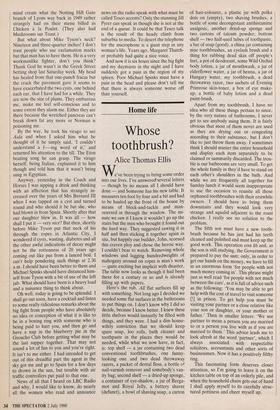Home life
Whose toothbrush?
Alice Thomas Ellis
We've been trying to bring some order into our lives. I've answered several letters — though by no means all I should have done — and Someone has his new table. It measures ten foot by four and a bit and had to be hauled up the front of the house by means of block-and-tackle and man- oeuvred in through the window. The mi- nute we saw it I knew it wouldn't go up the stairs but the men who brought it found out the hard way. They suggested sawing it in half and then sticking it together again in situ, but happily our builder, John, scorned this craven ploy and chose the heroic way. I couldn't bear to watch. Removing whole windows and lugging hundredweights of mahogany around on ropes is man's work — quite exciting but implicit with disaster. The table now looks as though it had been there for a century or so and is already filling up with papers.
Here's the rub. All flat surfaces fill up with something. Not long ago I decided we needed some flat surfaces in the bathrooms to put things on. I don't know why I did so decide, because I know better. I knew these little shelves would instantly be filled with things, and they were. I had a dim house- wifely conviction that we should keep spare soap, loo rolls, bath cleaner and toothpaste in the places they would be needed, while what we now have, in fact, is: top shelf — a jar containing two dead conventional toothbrushes, one funny- looking one and two dead throwaway razors, a packet of dental floss, a bottle of nail-varnish remover and somebody's van- ity bag; second shelf— a dried-up sponge, a container of eye-shadow, a jar of Berga- mot and Royal Jelly, a battery shaver (defunct), a bowl of shaving soap, a carton of hair-colourer, a plastic jar with polka dots on (empty), two shaving brushes, a bottle of some decongestant antihistamine analgesic, another dried-up sponge and two cartons of talcum powder; bottom shelf — two half-used tubes of toothpaste, a bar of soap (good), a china jar containing nine toothbrushes, an eyelash brush and a thing for rubbing dead skin off people's feet, a pot of deodorant, some Wild Orchid body lotion, a jar of mouthwash, a jar of elderflower water, a jar of henna, a jar of Hungary water, my toothbrush, a dead throwaway razor, two sachets of Evening Primrose skin-toner, a box of eye make- up, a bottle of baby lotion and a dead paint-brush.
Apart from my toothbrush, I have no idea who all these things pertain to since, by the very nature of bathrooms, I never get to see anybody using them. It is fairly obvious that most of them never are used as they are drying out or congealing according to their substance, but I don't like to just throw them away. I sometimes think I should muster the entire household and display each item separately to be claimed or summarily discarded. The trou- ble is our bathrooms are very small. To get the whole family in they'd have to stand on each other's shoulders in the bath. And while we are frequently all together for Sunday lunch it would seem inappropriate to use the occasion to reunite all those orphaned toothbrushes with their erstwhile owners. I should have to bring them downstairs and they would look very strange and squalid adjacent to the roast chicken. I really see no solution to the problem.
The fifth son must have a new tooth- brush because he has just had his teeth cleaned and polished and must keep up the good work. This operation cost 16 and, as the son is still studying, the Government is prepared to pay the sum: only, in order to get our hands on the money, we have to fill in an enormous form 'for people with not much money coming in'. This phrase might just as well read 'for people with not much between the ears', as it is full of advice such as the following: 'You may be able to get help with the cost of travel to visit someone [!] in prison. To get help you must be visiting your partner or a close relative like your son or daughter, or your mother or father.' Then in smaller letters: 'We use partner to mean a person you are married to or a person you live with as if you are married to them.' This advice leads me to look afresh at the word 'partner', which I always associated with respectable solicitors, accountants and other sorts of businessmen. Now it has a positively filthy ring.
This fascinating form deserves closer attention, so I'm going to leave it on the kitchen table on top of an orderly pile, and when the household chaos gets out of hand I shall apply myself to its carefully struc- tured pottiness and cheer myself up.














































 Previous page
Previous page